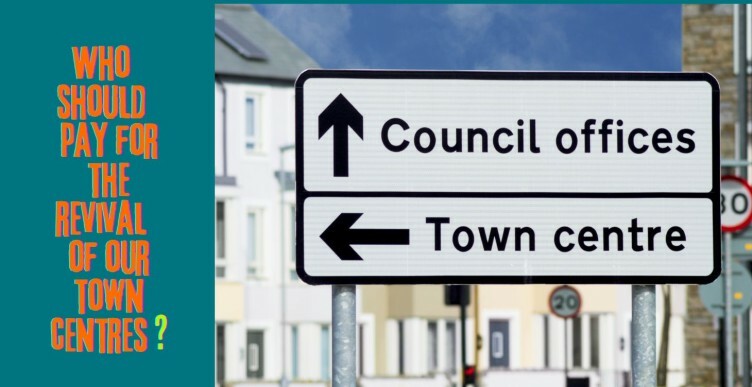REGENERATION
It's All About the Money, Money, Money...

Who should pay for essential town centre regeneration and revival? Should it be public or private money? Should the town centre businesses themselves contribute?
In my last article I explored the BID movement, whereby business owners pay for improvements to town centres through a levy on their rates bills.
The idea works well in principle and there have been some notable success stories. However as High Street businesses dwindle there are fewer rate - paying businesses on the High Street, and for those that are left, pockets are not deep. Banks, once big contributors to these schemes, are now all but gone from our High Streets.
But town centre regeneration projects are complex and expensive and the money must come from somewhere. I decided to speak to James Child, Director of the Whitehill and Bordon Regeneration Company and Andy Tree, Leader of Whitehill and Bordon Town Council to see whether they had any answers.
I began by asking James Child about the current private investment landscape in the UK.
‘We are at a difficult time in the investment world due to current economic conditions. There is too much uncertainty in the investment markets about the future outlook for the UK economy. The UK is now lagging behind most major economies in the world in recovering from the impacts of the pandemic and the shocks caused by the Ukraine War’.
Should local authorities and central government invest?
The Public Sector has a key role to play in acting as a catalyst for key investment decisions about our town centres and key employment sites. It is the right time for innovative solutions to be found to attract businesses and investors into our town centres.
What kind of investment strategy is needed?
It’s a difficult question. Town centres are no longer just about retail and food and beverage outlets. They are about places to work, places to meet and places to enjoy entertainment. Vibrancy is a key factor of place making and the future of our town centres.
How do you create vibrancy?
Creative thinking will unlock this vibrancy. It is time to put our energy into what our town centres should look like in future and what funding is needed to unlock their potential. It is only through close collaboration between local authorities, key local employers and delivery partners that we will achieve place making outcomes’.
Next I spoke to Andy Tree and asked him about the role of the public sector from his perspective:
Who should be accountable for the success of our town centres? Businesses or Politicians?
Businesses that benefit from footfall must take some responsibility for driving footfall. In the case of Bordon the success of the town centre is still the responsibility of the Whitehill and Bordon Regeneration Company and my role and the role of the Town Council is to hold them to account for the promises made in 2015 when planning permission was granted.
In the case of the District Council I will say that I think we should use all powers of leverage available to hold developers to account for promises made
Does the town council under your leadership have a responsibility to ensure the success of the town centre?
The town council is consulted on planning issues regarding the town centres but we cannot make decisions. However, as I firmly believe that it is very important to help town centre businesses thrive, we make policies that support the businesses in the town whenever we can. For example, all town council-controlled car parks are free of charge.
You were recently appointed deputy leader of East Hampshire District Council. What is the role of the District Council and how do they support town centre businesses?
The District Council have a clear mandate to support the development of our town centres and do so by direct investment - for example in Whitehill and Bordon they invested in the new leisure centre and will invest in the proposed new health hub - both of which will increase the viability and visibility of our town centre.
What about the idea that the bricks and mortar businesses that make up our town centres should themselves fund improvements and innovation? Are EHDC interested in putting the idea of a BID to the test in Whitehill and Bordon, or in other East Hampshire towns ?
I’ll give you the official line on this, which is that EHDC are aware of the two upcoming Waverley BID votes in Farnham and Godalming (covered in my last article) and they are watching the situation with interest.
And what is your personal opinion? Could a BID group be the right way fund investment in our town centre in the future?
I think a few years ago I would have been right behind this idea, before Brexit and then Covid really hammered small businesses. Now I think that the idea of a 2 % levy on rates is just not going to fly. We need to think of another way. I was interested to read that Haslemere had found an alternative way to invest in the town centre and I’m hoping to read in your next article some more insight into future plans!
You’ve probably heard that Lloyds bank has just been confirmed as the site for Haslemere’s new banking hub as a result of negotiations led by Haslemere Town Council. I know banking is a subject close to many and business owners’ hearts here in Whitehill and Bordon since Lloyds closed.
Could a banking hub be a possibility for Bordon?
It’s interesting that you bring this up as I’ve been discussing this exact thing with WBRC and others recently behind the scenes. Since the last bank in Bordon closed in 2017 banking hubs have become a mainstream idea and seem to be a brilliant solution to the problems of banking access. A banking hub in the town centre would be a great idea as it would also positively impact footfall. I would certainly be in favour of exploring this avenue.
Events are a key way of bringing footfall to the town centre and benefitting businesses and residents alike. What role should town and district councils play in these local events?
Events are really important. I was really pleased to see the partnership between WBRC and local business that brought The Soapbox Derby to the town this summer. It was a spectacular event and as you say it created a lot of business in the town. I’m also really impressed with the team that bring the weekly music events to the Shed and with the growing number of local organisations that organise events across the town.
The Town Council believe in community events as a strategy and do fund a number of events, for example we were primary funders of the Platinum Jubilee Festival run by the Town Centre Partnership specifically to unite the town and create good vibes.
With thanks to Andy Tree and James Child for their contributions
So, what is the answer?
Private investment in UK plc is on hold for the foreseeable future. The BIDS are running into difficulties. The public sector is already investing in some key infrastructure projects but need to step up as we move into another recession. New ideas are needed.
The most important thing is that local businesses, local authorities, developers and other local organisations are able to develop and maintain secure partnerships within which questions of investment and innovation can be rigorously debated and within which all parties can be held to account. It is down to the personalities involved to make sure that there are opportunities to network, contribute and work up creative ideas. The more safe space there is for different individuals to contribute thoughts and resources to the project the more successful the outcomes are likely to be.
With this in mind, WBRC are currently running a series of workshops in which a number of stakeholders including some local businesses are invited to share creative ideas with the development team. The focus is on placemaking and the future-proof development of Whitehill and Bordon. The findings of the most recent workshops will be the subject of the next article in this series, out at the end of September.







